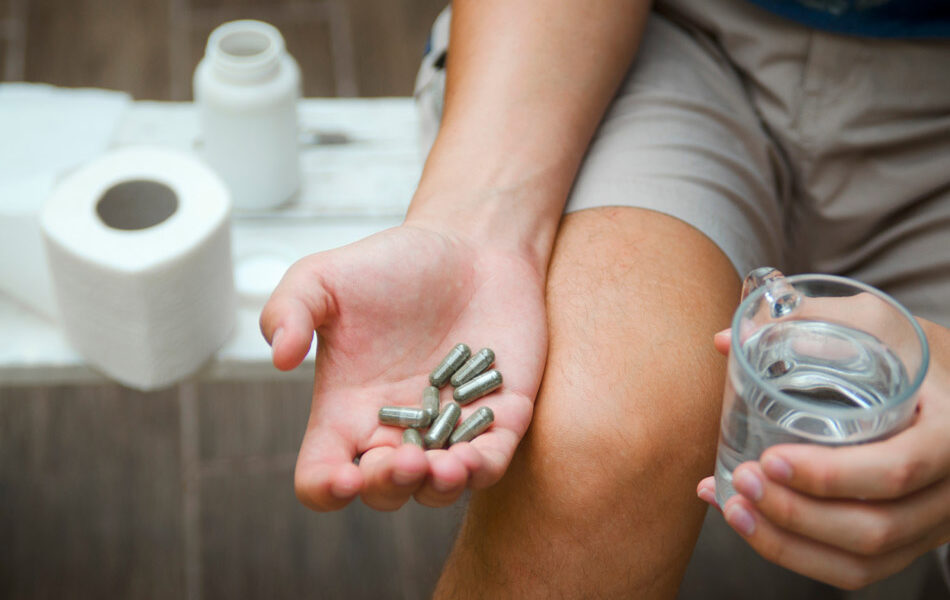Do Probiotics Make You Poop? There’s Something You Should Know
Poop problems? Find out if probiotics are the solution you’ve been looking for

Probiotic supplements have been proven to support your long-term health.
One huge benefit includes regular bowel movements due to an improved digestive system. You can take certain probiotic strains that rebalance the gastrointestinal tract.
Some people consume supplements to prevent issues like constipation or cramps. The same goes for those with IBS, so it’s important to determine how probiotics enforce a healthy gut.
In this article, you’ll discover whether probiotics encourage good bowel function.
Do Probiotics Make You Poop?
Yes, probiotics can make you poop and increase the frequency of bowel movements. This is because active probiotic strains help the digestive tract break down food faster. Better digestion means you’ll pass stool easily without pain or chronic constipation.
A study found that probiotic supplements regulate the fecal microbiome and feed your healthy gut bacteria that digest food. Too many bad bacteria can disrupt the whole digestive process, which may lead to serious constipation, diarrhea, stomach cramps, and bloating.
You should take probiotics if you struggle to go to the toilet regularly. There’s a chance that harmful bacteria have disrupted the natural ecosystem in your gut. Probiotics improve the gut transit time – the time it takes for digested food waste to turn into feces and be excreted.
Do Probiotics Help With Constipation?
Probiotic supplements can relieve constipation symptoms naturally. Strengthening your gut bacteria is a great way of regulating bowel movements. A probiotic supplement contains many active strains that balance pH and bacteria levels in your digestive tract.
Some people believe that probiotics cause constipation, but that’s not always true. Research suggests that those who take probiotic supplements will have regular bowel movements. This is because active bacteria strains increase short-chain fatty acids and bile salt metabolism.
Short-chain fatty acid production can help stimulate peristalsis – involuntary muscle contractions that move food through your digestive tract. This process is great for preventing constipation, as your body can properly break down food in the stomach and allow easier passage for stools.
What Are Probiotics?
Probiotics are live bacteria that support a healthy gut microbiome. This mixture of good bacteria is supposed to balance the natural ecosystem in your digestive tract. Some people consume these supplements to prevent constipation and stubborn bloating.
Certain probiotics can have either bacteria or yeast. Saccharomyces boulardii is a type of yeast that reduces inflammation in the gut. Most supplements contain bacteria strains like lactobacillus acidophilus to boost the immune system and fight off common infections.
You should picture your gut having a peaceful community. There is a healthy balance between good and bad bacteria. If something disrupts this system, your gastrointestinal tract can’t function properly, which makes probiotics great at replenishing your digestive health again.
Not all probiotics can be found in dietary supplements. You can find probiotic bacteria in fermented foods like yogurt, kombucha, sauerkraut, sourdough bread, and tempeh.
Can Probiotics Help With IBS?
Yes, taking probiotics could help those with irritable bowel syndrome (IBS). They feed your gut bacteria healthy microorganisms that reduce stomach pain. You can consume probiotics regularly if you wish to relieve IBS symptoms like bloating and cramping.
Research states that probiotics can be great for people with IBS. This long-term condition triggers bloating, cramps, constipation, and gut pain. The exact causes are unknown, but it may be associated with bacterial overgrowth, poor digestive motility, and certain food sensitivities.
Consuming healthy bacteria may combat these symptoms. Probiotics are designed to fight inflammation, reduce gas, increase bowel movements, and inhibit pathogens. If you’re struggling with irritable bowel syndrome, it might help to replenish your gut using probiotics.
Just remember that probiotics aren’t a medical treatment for IBS. You should consult with your doctor before taking supplements or any dietary product that claims to support digestive health.
Can Probiotics Cause Constipation?
Probiotics are safe supplements, but they may trigger side effects. They could cause a temporary increase in gas, bloating, and constipation. Those who get constipation while taking probiotics may need time to adjust to the helpful gut bacteria in their system.
Constipation isn’t a common side effect when it comes to probiotics. However, some people might notice a change in their bowel movements in the first few days. The gut has suddenly been introduced to new bacteria, which may disrupt the pH balance and bowel function.
Things should return to normal once your body has adjusted. Aim to follow popular gut health hacks in the meantime to help good gut bacteria reproduce. This includes drinking more water, consuming tea for bloating, practicing slow eating, and avoiding processed food products.
Stop taking the supplements immediately if you feel worse over time. Talk to your doctor about ways of relieving constipation and the possibility of trying different probiotic strains.
A Word From a Nutritionist
Probiotic supplements are great for your long-term health, but they might not suit everyone’s dietary routine. Some people prefer consuming probiotic-rich foods. These foods could include plain yogurt, sauerkraut, tempeh, kimchi, kombucha, pickles, and cottage cheese.
Studies have shown that kombucha relieves bloating and constipation. The high number of antioxidants protects your gut from chronic inflammation. Since this beverage contains active cultures, you won’t suffer from bacterial imbalances or an overgrowth of bad bacteria.
You should consume probiotic-rich foods if you don’t enjoy supplements. It’s recommended that people eat at least 1–2 of these foods a day to gain the health benefits. Remember that fiber is another important nutrient that makes you poop and improves weekly bowel movements.
Conclusion
Probiotics can help you poop by stimulating the gastrointestinal tract. They contain good bacteria that feed your gut microbiome and eliminate harmful pathogens. Just make sure to choose probiotic supplements that are natural and suitable for common digestive issues.

















































 Select your language:
Select your language: 








